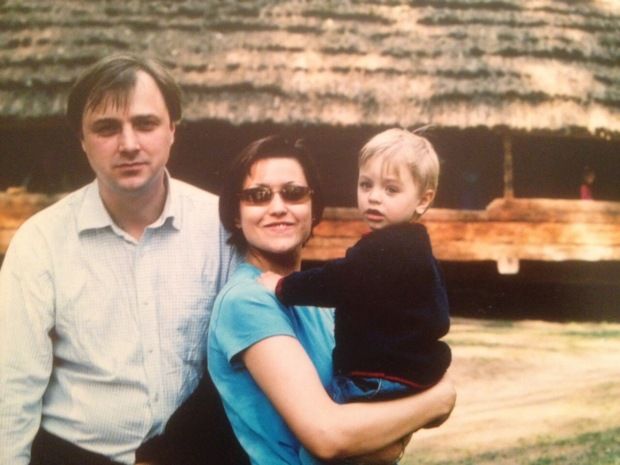Opinion
Voice of Ukraine in Denmark: Kyiv in our thoughts
Luka Perehinets
This article is more than 3 years old.

Luka at school (all photos: private)
February 24 will forever be remembered by Ukrainians as the day the Russian invasion began – the day its democracy and independence once again came under question.
As a Ukrainian living in Denmark, I’ve often felt detached from my home country, the land my family is from, but it remains the place that has shown me more than any other what true patriotism looks like.
Now, that is apparent more than ever.
“Wake up, the war has started”
On the morning of February 24, I unlocked my phone to find endless notifications from my parents and friends pouring in. I couldn’t think straight. The invasion of my homeland had begun.
My social media feed quickly made it clear: if you’re in Ukraine, your life is in danger, and there is no way of getting out. When an errant Russian missile hits the streets on which you once walked with your mother to buy groceries, your only thought is to survive.
As soon as I began to comprehend what any of it meant, I thought about my parents, who were in Kyiv, and began to worry about how they were going to get out. I called, but there was no answer. The security, which I once thought I could count on, had began to crumble within a matter of seconds.
Ukraine’s fight for freedom
Some of the scariest words a child can hear from a parent are: “Things will change forever, and the world will never be the same.” In the wake of the Russian Federation’s invasion of Ukraine, these were the words my father used in the first of what we now call ‘check-in’ meetings with the family.
I learn about families torn apart. Collapsed buildings. Blood-stained streets. Nothing will ever be the same. How can it be?
Large-scale wars such as this have never been live-streamed, second by second, minute by minute, with the world watching as the battles rage on. Air-raid updates pour in and are immediately flooded with angry Emoji reactions. It’s a new kind of dystopia.
At the outset of Ukraine’s fight against its occupation, a lot of questions arose about its ability to stand up against the supposed second biggest military on the face of the Earth, yet one cannot but applaud the fierce determination of the Ukrainian people’s fight for their independence and freedom.
Putin’s outlook
In his address to the nation, President Putin made his position clear: Ukraine’s existence as an independent state since the collapse of the Soviet Union on 26 December 1991 had been the sole reason for his obsession with Ukraine. They are ambitions masked by the so-called ‘denazification’ of the sought-after country.
As a Ukrainian, it’s incomprehensible to see a major head of state lie with such competency and consistency and yet it’s not surprising. He justifies his remarks concerning the freedom of the Ukrainian people by citing the vision of his idol Lenin, which was also based on falsehoods.
With more than a thousand years of history, Kyiv was already a major metropolis when Moscow was not even a village – these are the facts, and they are evermore ignored during Putin’s address to his compatriots.
We have never been here before
Designed on the blueprint of hatred, this seems more like a prepared attempt for genocide on the ground of ethnicity rather than a ‘surprising’ invasion.
With the actions of the Russian Federation, it is clear: whether the Russian state existed in the form of the Soviet Union or an empire, when it comes to Ukraine and its existence, it has always been a sore sight for the Russian imperialist project.
But despite the missile strikes and exploding mines, it seems the Ukrainian spirit is still a long way from being conquered.

Luka with his parents

About
Luka Perehinets
Luka is an 18-year old Ukrainian student living in Copenhagen who studies at the Copenhagen International School in pursuit of a degree in neuroscience. Over the last 18 years, he’s lived in four different countries: the United States, Russia, Ukraine and Denmark. In 2017 his family moved from Kyiv to Copenhagen due to his father’s employment at the World Health Organization. Luka has a younger brother and an older sister, who studies history and politics at the University of Edinburgh. In his free time, he enjoys spending time with his family and engaging in an in-depth analysis of scientific journals regarding the nervous system as well as a variety of sports. With a rich knowledge of Ukrainian history, Luka has been able to analyse the current events in Ukraine from a wider perspective.










































